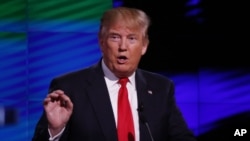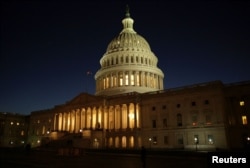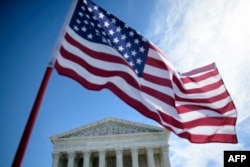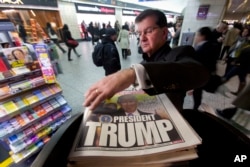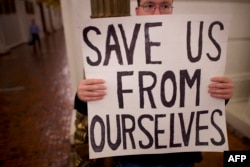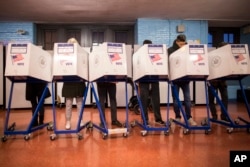At a presidential debate in March, Donald Trump was asked about his campaign pledge to reinstate waterboarding and other forms of torture on terror suspects.
Specifically, the moderator wanted to know how Trump would respond if U.S. military leaders refused his orders to use such harsh interrogation methods, which are illegal under international law.
"They won't refuse," Trump assured the moderator, shaking his head confidently and jabbing an index finger at his own chest. "They're not going to refuse me."
The billionaire real estate tycoon, who campaigned on the promise of running the country like a business and who has no government experience, again pointed to his business credentials.
"I've always been a leader. I've never had any problem leading people," Trump said. "If I say it, they're going to do it. That's what leadership is all about."
The problem is, when Trump takes office January 20, he will be faced with an elaborate system of checks and balances designed to prevent the president, or any other branch of government, from exercising too much power.
No one knows for sure if President Trump will attempt to govern like presidential candidate Trump. But if Trump does follow through on some of his more controversial campaign promises, what are the institutions that could constrain him?
Congress
The president must work on a routine basis with Congress to enact laws that allow and pay for the things he or she wants to do. The Senate also must confirm the president's Cabinet or Supreme Court picks. And as a last resort, lawmakers are able to impeach and remove the president.
But it's unclear how effective this Congress will be at constraining Trump. Trump's Republican Party now controls both houses of Congress. And although the GOP is badly divided over the unconventional Trump, many Republicans may have incentives to strike deals with the president to help advance parts of their conservative agenda.
Democrats are likely to put up roadblocks for Trump, much the way Republicans were able to obstruct the agenda of President Barack Obama. But it'll be a bigger challenge, since Democrats in 2013 made it harder for the minority party to filibuster presidential nominees. But it may not matter, since Trump may be able to cobble together a coalition of support from both parties to pass certain parts of his legislative program.
Courts
The judicial branch is another important check because it can interpret laws or declare them to be unconstitutional.
However, Trump is set to have considerable power to influence the courts. At the beginning of his term, Trump will get to fill an empty spot on the Supreme Court. If, as many expect, a second or third vacancy occurs during Trump's presidency, he will be able to shape the court for generations.
Another consideration: Trump will also inherit over 100 vacancies in federal courts. That number is uncommonly high, thanks to Republicans who refused to confirm Obama's judicial nominees.
Civil society
The morning after Trump won the election, the American Civil Liberties Union issued a blunt warning to the president-elect: "See you in court." Specifically, the ACLU took aim at Trump's threats to impose a ban on Muslim immigration and deport the nation's estimated 11 million undocumented immigrants.
The ACLU is just one part of a robust network of non-governmental organizations preparing to counter various parts of Trump's agenda. They'll likely do this by issuing legal challenges, lobbying lawmakers, and organizing protests and social media campaigns in an attempt to mobilize public opinion.
Free press
In the minds of the U.S. founding fathers, freedom of the press was the single most important protector against tyranny. In fact, a free press is so fundamental that many consider it to be the fourth branch of government, or the "fourth estate."
Trump has had a notoriously rocky relationship with the media. By one estimate, Trump garnered about $5 billion worth of free media coverage during the election campaign. The media, in turn, profited from a massive ratings bonanza. But Trump has complained the media is biased against him, and regularly launches verbal attacks against media outlets and individual journalists that criticize him. He has also threatened to loosen libel laws so that it will be easier for him to sue media outlets and "win lots of money."
Even if the mainstream press does its job, its power is questionable. That is partly because of the vast changes in technology, as well as increased ideological polarization that have allowed individuals to interact only with those media that reinforce their existing worldviews.
Federal system of government
In the U.S. federal system, powers are not only divided horizontally among the three branches of government: president, congress and courts. They are also divided vertically among the different levels of government: national, state and local.
There's long been tension between federal authorities and those at the state and local levels. That's particularly been the case during the past eight years, when conservative states have pushed back against Obama's laws, including his signature health care law.
Under Trump, the roles could reverse, with large U.S. cities, which tend to be liberal, likely fighting back against Trump on issues such as immigration and climate change.
Civil service
While the president gets to appoint and fire senior staff of government agencies, the bulk of the employees in those agencies is shielded from political interference by civil service protections written into U.S. law. This provides an important, though often overlooked, check on presidential power.
In a Trump administration, tensions could emerge around the many federal workers who are focused on programs related to global warming and gender equality. Trump transition officials reportedly have asked for lists of programs and employees working on those programs, raising fears of politically motivated cuts. Trump transition officials have denied those claims.
Those close to Trump have said civil service reform is high on his agenda, a move that would fit his "drain the swamp" policy that aims to reduce the size of the federal government. If he does attempt such reforms, he could have an ally in many Republican lawmakers, who have long wanted to make it easier to fire poor-performing workers, arguing the federal employee system is bloated and inefficient.
Elections
If nothing else works as a check, the American people are given the ultimate say on the president's performance. Voters can remove a president, or choose to re-elect him to a second term, after four years. Voters can also punish the president's party during Congressional elections, which occur two years into the president's first term in office.
But the upcoming midterm elections may not be much help to Democrats. While the Democrats may be able to make up some ground in the House of Representatives, they will have a very hard time doing so in the Senate, since more Democrats than Republicans are up for reelection in 2018.
Explainer: Checks and Balances




